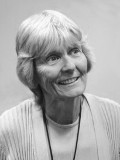GOTO Amsterdam is a vendor independent international software development conference with more that 50 top speaker and 500 attendees. The conference covers topics such as Java, Open Source, Agile, Architecture, Design, Web, Cloud, New Languages and Processes.
Linda Rising, TweetQueen of Patterns. Author of numerous Books

Biography: Linda Rising
Linda Rising has a Ph.D. from Arizona State University in the field of object-based design metrics and a background that includes university teaching and industry work in telecommunications, avionics, and strategic weapons systems.
An internationally known presenter on topics related to patterns, retrospectives, agile development approaches, and the change process, Linda is the author of numerous articles and four books: Design Patterns in Communications Software (SIGS Reference Library), The Pattern Almanac 2000
, The Patterns Handbook: Techniques, Strategies, and Applications (SIGS Reference Library)
, and Fearless Change: Patterns for Introducing New Ideas
Twitter: @RisingLinda
Find more information about Linda at www.lindarising.org
Video presentation: Born To Cycle
Presentation: TweetBeyond Agility - Resilience
The real power of agility or let's use the term the psychologists choose, resilience, is the key not to just better software, but to a better life.
Our first tendency when we see good performance is to explain it away by saying, "Oh, s/he was born with that talent." Extensive research on mindset suggests different answer: "Yes, s/he seems to have talent but s/he also must have worked hard to develop it. I may or may not have a special gift in this area but I can be better tomorrow if I am determined to improve." It's not just about talent. It's also about working hard and about the quality of our work--"deliberate practice," as Anders Ericsson calls it. This is not only an important response for ourselves, but for the others in our lives, especially our children.
Based on this research, the U.S. military has created a resilience-building program and is trying to teach the skills needed to hold an agile mindset. The program is designed by a team of researchers at the University of Pennsylvania. This effort—one of the largest psychological interventions ever attempted—holds lessons for all of us--at any age—and at any point in our careers--because we all want to learn how to be more agile, more resilient in our thinking.
In this presentation, Linda will outline the curriculum currently being used in the U.S. military training and provide some translation to the world of software and life.
Presentation: TweetClosing Keynote: Science or Stories?
Smart people are logical and objective. They (we) look at the evidence to help make the best possible decisions. We are not influenced by hype or emotion and as a result our behavior reflects the best the world has to offer.
Cognitive science now tells us that these beliefs about ourselves and others (especially scientists) are wrong. All of us tend to make decisions based on intuition or emotion and then justify those decisions later with logic, a process called rationalization.
The most influential element in our environment is not scientific evidence but stories. We love stories. Research shows that we are more likely to buy a product or embrace a process because of a friend, colleague, or relative and ignore evidence that might go against that decision.
Are these bad things? Is there anything we can do about it?
We have a long history of being influenced by stories and it has helped us survive. Linda suggests that the real answer is we need both approaches -- stories and emotion + evidence and logic. Both approaches have flaws and benefits. Linda will share examples and tell her own stories to try to convince you and try to help us do a better job of making decisions.
Workshop: Fearless Change: Patterns for Introducing New Ideas Tweet
We attend conferences or read books and articles, discover new ideas we want to bring into our organizations — but we often struggle when trying to implement those changes. Unfortunately, the people introducing change are not always welcomed with open arms.
Linda Rising offers proven change management strategies to help you become a more successful agent of change in your organization. Learn how to plant effective seeds of change, and what forces in your organization drive or block change. In addition to using these approaches to change your organization, you can use them to become a more effective person — these strategies or patterns are useful in many different settings.
Come and discuss your organizational and personal change challenges. Linda shares lessons from her book, "Fearless Change: Patterns for Introducing New Ideas" and a forthcoming More Fearless Change. Learn how to overcome adversity to change and to celebrate your improvement successes along with your organization's new found practices.

Workshop: Patterns for Improved Customer Interaction Tweet
With the emphasis on in-depth customer interaction during development, agile team members are being asked to take an active role in working with customers. This evolving role poses a big challenge for many who, in the past, rarely met "real" customers.
Linda Rising presents patterns, she has used successfully to help software professionals in their direct, face-to-face interactions with customers. These patterns describe solutions to common problems that occur again and again when dealing with customers and users. The patterns Linda discusses, have memorable names such as It's A Relationship — Not A Sale, Be Responsive, Show Personal Integrity, Build Trust, and Take Your Licks. Pattern names build a vocabulary that allows you and your development team to have meaningful conversations about — and to ultimately improve — customer relationships and the software you deliver.
Benefits from this tutorial:
- A vocabulary based on patterns to improve communication with customers
- Simple and powerful ways to improve your own personal interactions
- How to focus on what is best for both you and your customers

